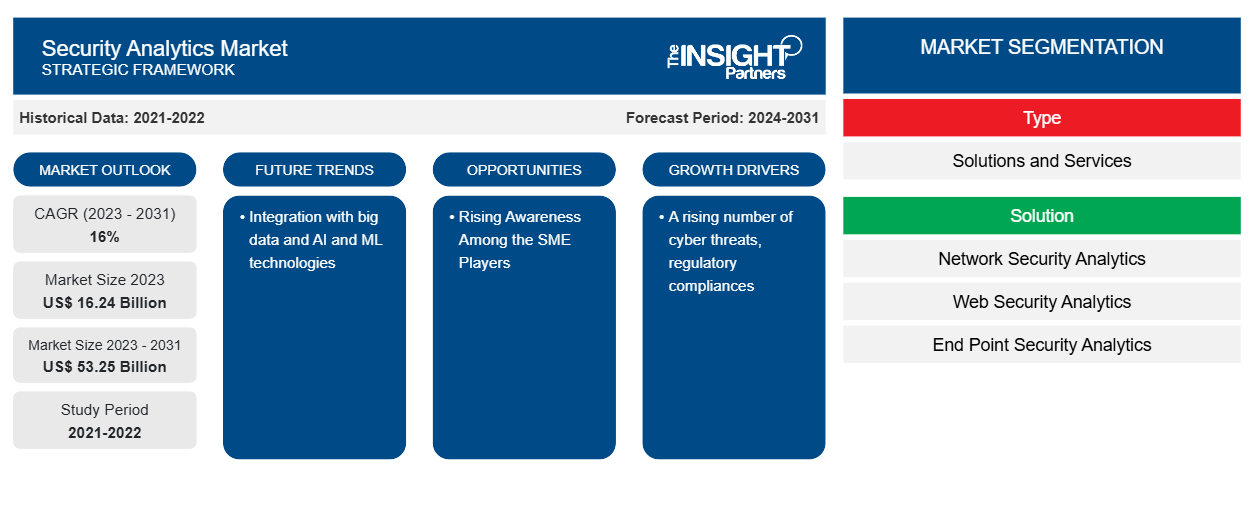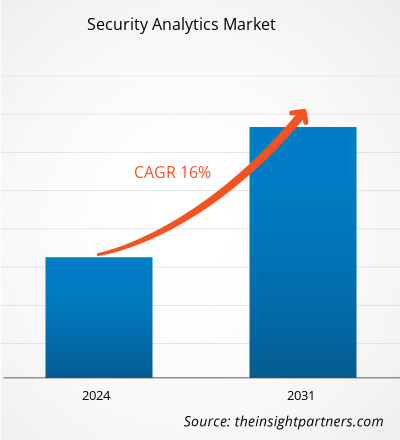Security Analytics Market Growth Drivers and Forecast by 2031
Security Analytics Market Size and Forecast (2021 - 2031), Global and Regional Share, Trend, and Growth Opportunity Analysis Report Coverage: By Type (Solutions and Services), Solution (Network Security Analytics, Web Security Analytics, End Point Security Analytics, and Others), Deployment (On-premise, Cloud, and Hybrid), Industry Vertical (BFSI, Telecom and IT, Government and Defense, Consumer Goods and Retail, and Others), and Geography
Historic Data: 2021-2022 | Base Year: 2023 | Forecast Period: 2024-2031- Report Date : Apr 2026
- Report Code : TIPTE100000317
- Category : Technology, Media and Telecommunications
- Status : Data Released
- Available Report Formats :


- No. of Pages : 150
The Security Analytics market size is projected to reach US$ 53.25 billion by 2031 from US$ 16.24 billion in 2023. The market is expected to register a CAGR of 16.0% during 2023–2031. Integration with big data and AI and ML technologies is likely to remain a key trend in the market.
Security Analytics Market Analysis
Security analytics is becoming more and more important for maintaining enterprise security as networks continue to change and security threats become more sophisticated. Security analytics assists IT and security teams in proactively (and reactively) identifying threats before they cause data loss or other negative consequences by merging software, algorithms, and analytical procedures.
Security Analytics Market Overview
Machine learning, behavioral analysis, and customization are the main forces behind advancement in security analytics technology today. Instead of requiring users to use proprietary data lakes, several SIEM packages now let enterprises use their current ones. Additionally, several solutions have made their machine learning, enrichment, and analytics models publicly available so that customers can better understand and adjust them as necessary. In order to tackle threat detection and response in a more automated and telemetry-rich manner, the industry is beginning to integrate SIEM, User Entity Behavioral Analytics (UEBA), Security Orchestration, Automation and Response (SOAR), and Extended Detection and Response (XDR). Security analytics have advanced rapidly in recent years.
Customize This Report To Suit Your Requirement
Get FREE CUSTOMIZATIONSecurity Analytics Market: Strategic Insights

-
Get Top Key Market Trends of this report.This FREE sample will include data analysis, ranging from market trends to estimates and forecasts.
Security Analytics Market Drivers and Opportunities
Rising Cyber Threats to Favor the Market
With its ability to leverage cutting-edge technologies to detect possible threats, reveal concealed vulnerabilities, and provide organizations with insights that enable them to strengthen their defenses and proactively mitigate risks, security analytics has become an indispensable instrument in the ongoing fight against cybercriminals. According to a 2024 report by Check Point Software Technologies Ltd., there has been a steady increase in cyber threats in 2023. Every week, there were an average of 1158 cyberattacks against businesses worldwide. This indicates a consistent and concerning trend in the digital threat landscape, with cyberattacks rising by 1% from 2022 and maintaining the notable growth from prior years. This is driving the market for security analytics.
Rising Awareness Among the SME Players
A CyberPeace Foundation survey states that 43% of all cyberattacks target startups and small companies. Also, roughly 46% of SMEs lacked knowledge of risk management in the digital realm. Cyber threats are a real threat, and their methods of operation are getting more sophisticated. While the majority of large, well-established organizations have the proper security measures in place to fend off dangers like malware and data breaches, small businesses are more vulnerable to cybersecurity risks because of their constrained resources. Thus, this opens up opportunities for the adoption of security analytics tools among the SMEs.
Security Analytics Market Report Segmentation Analysis
Key segments that contributed to the derivation of the Security Analytics market analysis are type, solution, deployment, and industry vertical.
- Based on the type, the Security Analytics market is divided into solutions and services. The solutions segment held the largest share in 2023.
- Based on the solution, the market is divided into network security analytics, web security analytics, endpoint security analytics, and others.
- Based on the deployment, the market is divided into on-premise, cloud, and hybrid.
- Based on the industry vertical, the market is divided into BFSI, telecom and IT, government and defense, consumer goods and retail, and others.
Security Analytics Market Share Analysis by Geography
The geographic scope of the Security Analytics market report is mainly divided into five regions: North America, Asia Pacific, Europe, Middle East & Africa, and South & Central America.
North America holds a significant share of the Security Analytics market in 2023. North America is one of the most heavily impacted regions in the world by cyberattacks. This is due to the prominent presence of financial sectors, essential infrastructure, and shared opportunities, such as private-public partnerships, all of which contribute to a more robust cyber ecosystem. Regional governments concentrate on enhancing legislation and policies to combat cyber risks in their countries. This is driving the demand for the security analytics market in the region.
Security Analytics
Security Analytics Market Regional InsightsThe regional trends influencing the Security Analytics Market have been analyzed across key geographies.
Security Analytics Market Report Scope
| Report Attribute | Details |
|---|---|
| Market size in 2023 | US$ 16.24 Billion |
| Market Size by 2031 | US$ 53.25 Billion |
| Global CAGR (2023 - 2031) | 16% |
| Historical Data | 2021-2022 |
| Forecast period | 2024-2031 |
| Segments Covered |
By Type
|
| Regions and Countries Covered |
North America
|
| Market leaders and key company profiles |
|
Security Analytics Market Players Density: Understanding Its Impact on Business Dynamics
The Security Analytics Market is growing rapidly, driven by increasing end-user demand due to factors such as evolving consumer preferences, technological advancements, and greater awareness of the product's benefits. As demand rises, businesses are expanding their offerings, innovating to meet consumer needs, and capitalizing on emerging trends, which further fuels market growth.

Security Analytics Market News and Recent Developments
The Security Analytics market is evaluated by gathering qualitative and quantitative data post primary and secondary research, which includes important corporate publications, association data, and databases. A few of the developments in the Security Analytics market are listed below:
- IBM (NYSE: IBM) today announced a major evolution of its flagship IBM QRadar SIEM product: redesigned on a new cloud-native architecture, built specifically for hybrid cloud scale, speed and flexibility. IBM also unveiled plans for delivering generative AI capabilities within its threat detection and response portfolio – leveraging Watsonx, the company's enterprise-ready data and AI platform. (Source: IBM, Press Release, November 2023)
- Symantec, a division of Broadcom Inc. (NASDAQ: AVGO), is partnering with Google Cloud to embed generative AI (gen AI) into the Symantec Security platform in a phased rollout that will give customers a significant technical edge for detecting, understanding, and remediating sophisticated cyber-attacks. (Source: Broadcom Inc., Press Release, September 2023)
Security Analytics Market Report Coverage and Deliverables
The “Security Analytics Market Size and Forecast (2021–2031)” report provides a detailed analysis of the market covering below areas:
- Security Analytics market size and forecast at global, regional, and country levels for all the key market segments covered under the scope
- Security Analytics market trends, as well as market dynamics such as drivers, restraints, and key opportunities
- Detailed PEST/Porter’s Five Forces and SWOT analysis
- Security Analytics market analysis covering key market trends, global and regional framework, major players, regulations, and recent market developments
- Industry landscape and competition analysis covering market concentration, heat map analysis, prominent players, and recent developments for the Security Analytics market
- Detailed company profiles
Frequently Asked Questions
Ankita is a dynamic market research and consulting professional with over 8 years of experience across the technology, media, ICT, and electronics & semiconductor sectors. She has successfully led and delivered 100+ consulting and research assignments for global clients such as Microsoft, Oracle, NEC Corporation, SAP, KPMG, and Expeditors International. Her core competencies include market assessment, data analysis, forecasting, strategy formulation, competitive intelligence, and report writing.
Ankita is adept at handling complete project cycles—from pre-sales proposal design and client discussions to post-sales delivery of actionable insights. She is skilled in managing cross-functional teams, structuring complex research modules, and aligning solutions with client-specific business goals. Her excellent communication, leadership, and presentation abilities have enabled her to consistently deliver value-driven outcomes in fast-paced and evolving market environments.
- Historical Analysis (2 Years), Base Year, Forecast (7 Years) with CAGR
- PEST and SWOT Analysis
- Market Size Value / Volume - Global, Regional, Country
- Industry and Competitive Landscape
- Excel Dataset
Recent Reports
Testimonials
The Insight Partners' SCADA System Market report is comprehensive, with valuable insights on current trends and future forecasts. The team was highly professional, responsive, and supportive throughout. We are very satisfied and highly recommend their services.
RAN KEDEM Partner, Reali Technologies LTDsI requested a report on a very specific software market and the team produced the report in a few days. The information was very relevant and well presented. I then requested some changes and additions to the report. The team was again very responsive and I got the final report in less than a week.
JEAN-HERVE JENN Chairman, Future AnalyticaWe worked with The Insight Partners for an important market study and forecast. They gave us clear insights into opportunities and risks, which helped shape our plans. Their research was easy to use and based on solid data. It helped us make smart, confident decisions. We highly recommend them.
PIYUSH NAGPAL Sr. Vice President, High Beam GlobalThe Insight Partners delivered insightful, well-structured market research with strong domain expertise. Their team was professional and responsive throughout. The user-friendly website made accessing industry reports seamless. We highly recommend them for reliable, high-quality research services
YUKIHIKO ADACHI CEO, Deep Blue, LLC.This is the first time I have purchased a market report from The Insight Partners.While I was unsure at first, I visited their web site and felt more comfortable to take the risk and purchase a market report.I am completely satisfied with the quality of the report and customer service. I had several questions and comments with the initial report, but after a couple of dialogs over email with their analyst I believe I have a report that I can use as input to our strategic planning process.Thank you so much for taking the extra time and making this a positive experience.I will definitely recommend your service to others and you will be my first call when we need further market data.
JOHN SUZUKI President and Chief Executive Officer, Board Director, BK TechnologiesI wish to appreciate your support and the professionalism you displayed in the course of attending to my request for information regarding to infectious disease IVD market in Nigeria. I appreciate your patience, your guidance, and the fact that you were willing to offer a discount, which eventually made it possible for us to close a deal. I look forward to engaging The Insight Partners in the future, all thanks to the impression you have created in me as a result of this first encounter.
DR CHIJIOKE ONYIA MANAGING DIRECTOR, PineCrest Healthcare Ltd.Reason to Buy
- Informed Decision-Making
- Understanding Market Dynamics
- Competitive Analysis
- Identifying Emerging Markets
- Customer Insights
- Market Forecasts
- Risk Mitigation
- Boosting Operational Efficiency
- Strategic Planning
- Investment Justification
- Tracking Industry Innovations
- Aligning with Regulatory Trends





 Get Free Sample For
Get Free Sample For